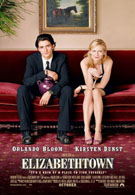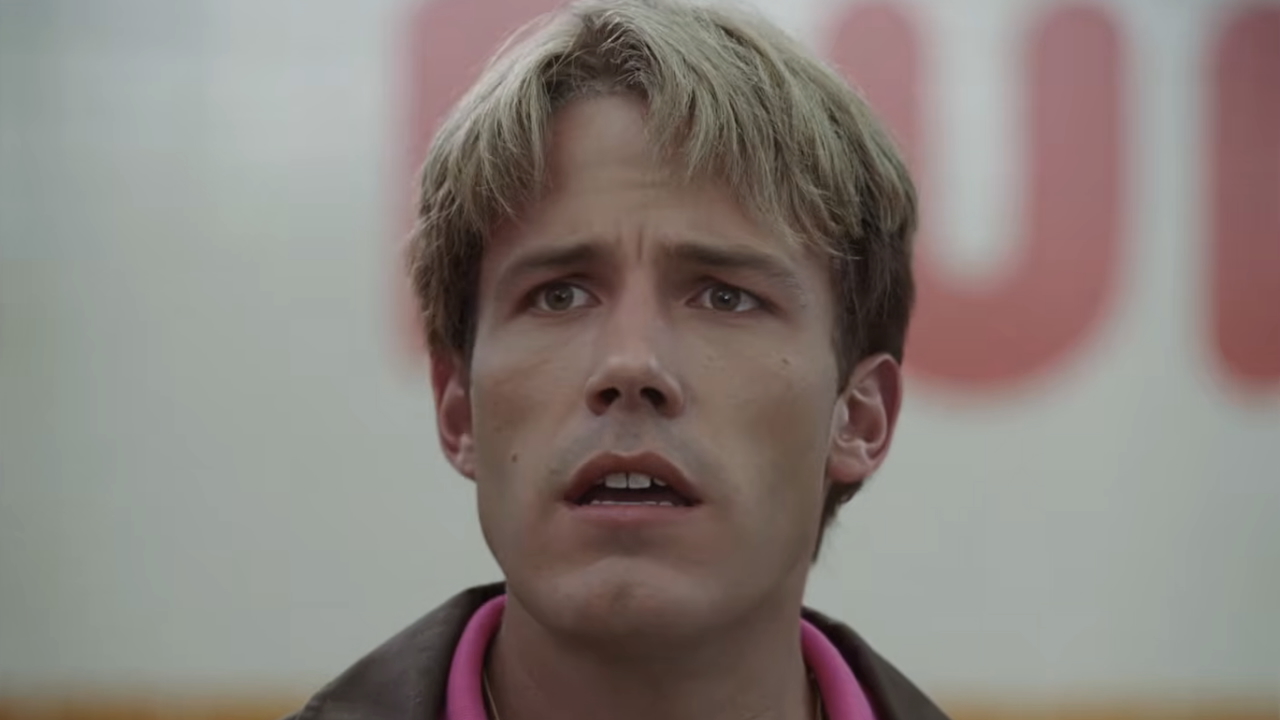Elizabethtown is the kind of film that wastes the one “F” word its rating allows on its soundtrack. But then it’s a Cameron Crowe movie, and long before Zach Braff was kicking ass on movie music, he was locked in a room obsessing over piles of musical snips. Actually, while we’re talking Braff, let’s address this pic’s rather uninspiring trailers, which make it seem a lot like a clone of Garden State. The ads aren’t misleading, in some ways it is. But though Elizabethtown’s premise and predilection for unique, mood-setting music gives it an outer veneer similar to Zach Braff’s critically hugged directorial debut, the emotional impact of Crowe’s local-boy-comes-home movie is entirely different.
The first question that needs to be asked is this: Can Orlando Bloom act? He was capable playing the ethereal and often silent elf Legolas in Lord of the Rings, but his performance in Pirates of the Caribbean was a stiff boor. He’s got a talent for swinging around swords, but so far we’ve no evidence that there’s anything to him when he’s not holding a rapier. In Elizabethtown, he’s the film’s central focus, and the whole thing hinges on him. He’s also playing an American, which means he has to pull off a convincing American accent. Bloom isn’t just good as Drew Baylor, he is at times fantastic, and frankly it’s a surprise how much this young, heavily marketed actor’s skills have taken a big step forward. He doesn’t talk much, except through narration. Instead Crowe uses Bloom’s rather expressive face to make Drew the kind of guy who walks through a world of other, more dynamic characters and finds himself reacting to and changed by them.
Drew, is a big-deal corporate executive, and he works for a company that might as well be Nike. He’s responsible for their biggest shoe launch ever… and it’s an utter disaster. We meet him on the day that he goes to face up to his failure, a meeting with his boss in which he’s told he’ll cost the company what you could basically round off to a billion dollars. He’s in the midst of a public disgrace, and in a few days every business magazine in the country will be plastered with his picture sporting the caption of “loser”. Put simply, the world is in the middle of taking a gigantic crap on Drew Baylor. His girlfriend dumps him, his career is irrevocably ruined, and then he gets a phone call. His father died while visiting relatives in Kentucky, and his mother needs him to take his dad’s blue suit, fly out there, and bring him home. Drew is after all, the responsible one.
What he finds in Elizabethtown, Kentucky turns this into a massive journey for him, a slow sort of awakening that tackles the BIG IMPORTANT things. Crowe is no stranger to unabashed sentimentality, and he uses it to build his story around the death of Drew’s father. It’s the glue that holds everything together, keeps it all connected. Towards the end of the film, his Dad becomes almost a passive observer, and you get the feeling that he and his kid are connecting in a way they didn’t before he was dead. There result is a film filled with moments of real brilliance. In part it’s a movie about the simpler things: a guy meeting old relatives, developing an interest in his folksy cousin’s washed-up band, seeing his nephews, hanging out in his Grandma’s kitchen table planning a funeral with his father’s friends while kids whoop and holler in the background. Crowe’s touch there is subtle and filled with realism. Close your eyes and you’ll see yourself there, back at Grandmas house, the whole family over for dinner. These are people who love Drew’s father, and though at first hesitant, he can’t help but immerse himself in them. There’s a real sense of security and safety there that cuts right through a lot of life’s bullshit to the stuff that really matters.
It’s the scenes with Drew’s large, extended family that most moved me, but the other part of Crowe’s script is big, emotional romance; because of course there’s a girl. In a sense that leaves the film a little scattered. Drew spends his days with his relatives, and his nights at his hotel talking to Claire (Kirsten Dunst), whom he met on the flight out there. Structurally speaking, maybe it doesn’t all quite fit together, but in terms of Drew’s emotional pilgrimage… it’s absolutely perfect.
Claire is one of those cutesy, energetic, talky girls that seem only to exist in Cameron Crowe movies. She’s sort of attached herself to Drew, and makes it her mission to help him through whatever the heck it is that’s going on in his life. At first she’s a little annoying, but then you start falling for her. Drew by the way does too. I’ve never been a big fan of Kirsten, but she works here, her natural weirdness harnessed into the right kind of character. By the end of the film, she’s not just Drew’s love interest, she’s more like his spirit guide and when the movie takes a left turn into becoming a big, cross-country ode to the greatness of America, she helps hold the thing together.
Elizabethtown is a moving, emotional, heart-grabbing journey; another unconventional Cameron Crowe movie driven by relatable characters and mood-suited music. It’s not flawless, and without so many really great performances it could have easily turned into nothing but a bunch of ill-fitting parts. People are going to argue that certain scenes should have been cut; others are going to whine over the film’s to-happy-ending. But it’s a wonderfully romantic movie that touches on loss and life. There’s a magic in it somewhere, the kind that lifts you up and carries you right along with it. It sounds damn cheesy to say it, but Elizabethtown is life-affirming, the sort of film that leaves you thinking about your own future. I left the theater emotionally satisfied and sometimes that’s better than having a perfectly tuned plot.
Your Daily Blend of Entertainment News

